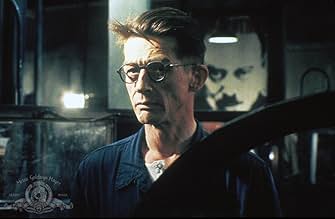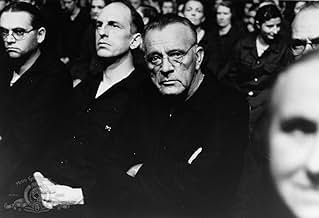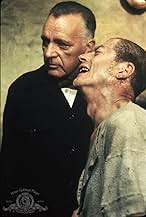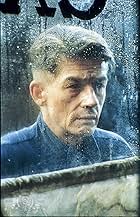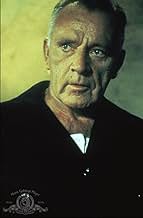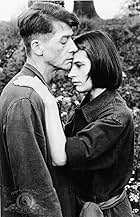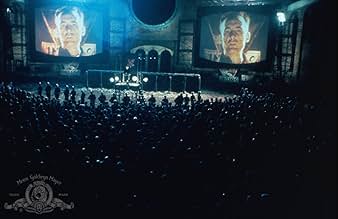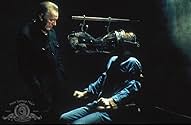Dans une société totalitaire du futur, un homme dont le travail consiste à réécrire l'histoire tente de se rebeller en tombant amoureux.Dans une société totalitaire du futur, un homme dont le travail consiste à réécrire l'histoire tente de se rebeller en tombant amoureux.Dans une société totalitaire du futur, un homme dont le travail consiste à réécrire l'histoire tente de se rebeller en tombant amoureux.
- Réalisation
- Scénario
- Casting principal
- Nomination aux 1 BAFTA Award
- 6 victoires et 3 nominations au total
Avis à la une
Also, to me at least the missing information made the story feel like it is moving in fast forward. So the pacing felt a bit weird to me.
Personally I enjoyed the film because it put the world and story outside my head. Making me visually look at this twisted world and also experience it from a perspective that's not mine. Which was really interesting.
For these reasons I would recommend all people who read the book watch this movie but definitely not to people who haven't read the book.
God forbid!
"1984" is probably one of the most, if not THE most, masterful transitions from book to movie I have ever seen. Easily, its most impressive aspect was its phenomenal accuracy, attention to detail, etc. In other words, this film was FAITHFUL, in every sense of the word, to its source material. One can't give such a statement about films these days.
Amazing casting, terrific musical score, and mind-blowing sets, cinematography, and direction, "1984" is surely a unique treasure, and one that still retains the same timeless messages even decades since its release.
The flaw in the film, for me, is that I felt like I only enjoyed and understood this movie BECAUSE I had read the book already. There is a theory I once heard and agree with: the closer an adaptation is to the source, the more necessary it is to read the source. A good adaptation is faithful to the essentials of a story but makes necessary changes so that it not only becomes cinematic, yet also becomes something that a viewer unfamiliar with the source material can understand. I think if I were ignorant of the story, there are too many things that would confuse me in this film which the book seems to go out of its way to explain.
For example: Who/Where exactly is Oceania? How did the countries go from their current political state to the envisioned one? Why do the people gather in mass and scream passionate hateful exclamations at the screen? What exactly does Winston actually do? Who are the proles? I praise movies that can effectively tell a story without means of voice-over, a much overused device in films. In this case though, I think a little may have helped, not necessarily wall-to-wall, but sparingly used. The movie is effective by being more ambiguous than the book, but I tend to think maybe it is too ambiguous.
In summary, read the book if you haven't (either before or after seeing the film) to get a complete overview of the author's vision. With that as a foundation, this really is a good cinematic portrayal, and of a story that is still relevant and not impossible to come to pass. Obviously 1984 is long since gone bye-bye, but 2084 or 2054? Oppression can always come as long as people desire self-centered power and the masses don't pay close attention.
Le saviez-vous
- AnecdotesIn poor health during most of the filming, Richard Burton had great difficulty remembering his lines and sometimes had to film a scene dozens of times before he could get it right. The scene in O'Brien's apartment where he is talking to Winston about Goldstein's book took a record of forty-one takes for Burton to say his speech without fumbling his lines.
- GaffesWinston reads a newspaper article titled "INSOC IN RELATION TO CHESS BROTHER WINS." The party name should be spelled "INGSOC."
- Citations
Winston Smith: [reads from Goldstein's book] "In accordance to the principles of Doublethink, it does not matter if the war is not real, or when it is, that victory is not possible. The war is not meant to be won. It is meant to be continuous. The essential act of modern warfare is the destruction of the produce of human labor. A hierarchical society is only possible on the basis of poverty and ignorance. In principle, the war effort is always planned to keep society on the brink of starvation. The war is waged by the ruling group against its own subjects. And its object is not victory over Eurasia or Eastasia, but to keep the very structure of society intact." Julia? Are you awake? There is truth, and there is untruth. To be in a minority of one doesn't make you mad.
- Crédits fousThe movie begins with the title, "Who controls the past controls the future. Who controls the present controls the past."
- Versions alternativesFrom director of photography Roger Deakins: "Be careful which '1984' you watch as some do not have the 'Bleach Bypass' effect built in. As the effect was done on all the prints, the IP and subsequent INs do not reflect the intended look of the film."
- ConnexionsFeatured in Eurythmics: Sexcrime (Nineteen Eighty-Four) (1984)
- Bandes originalesOceania,'Tis For Thee
Music by Dominic Muldowney
Lyrics by Jonathan Gems
Sung by the London Voices, directed by Terry Edwards
Soprano soloist: Sally Mates
Contralto soloist: Linda Hirst
Conducted by Dominic Muldowney
Meilleurs choix
- How long is 1984?Alimenté par Alexa
- What are the Party members chanting at the end of the Two Minutes Hate? Some sources have subtitles saying "big!".
- What is a Proletariat?
- What is the significance of the "Oranges and Lemons" poem?
Détails
- Date de sortie
- Pays d’origine
- Langue
- Aussi connu sous le nom de
- Neunzehnhundertvierundachtzig
- Lieux de tournage
- Sociétés de production
- Voir plus de crédits d'entreprise sur IMDbPro
Box-office
- Budget
- 3 000 000 £GB (estimé)
- Montant brut aux États-Unis et au Canada
- 8 430 492 $US
- Week-end de sortie aux États-Unis et au Canada
- 29 897 $US
- 16 déc. 1984
- Montant brut mondial
- 8 431 544 $US
Contribuer à cette page



